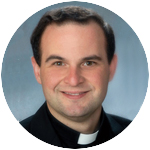
Father Eric J. Banecker
Many people have shared with me in recent days their pain about the suspension of public Mass — and now, of public celebration of the Paschal Triduum. Often their remarks include a resolution never to take the sacraments for granted again.
For my part, I can’t wait for the day when the faithful people of God can be present again at our liturgies. And this renewed appreciation is a very good thing which we can all take from these days!
When I was a student at St. Charles Seminary, there were certain hymns that we seemed to sing all the time. They are beautiful hymns, don’t get me wrong. But some seemed to constantly be on the repertoire.
Yet ironically, I miss hearing many of them now as a parish priest. One is the venerable classic “Holy God, We Praise Thy Name.” The third verse concludes with words that always gave me pause: “… and adoring bend the knee, while we own the mystery.”
The mystery the words refer to is the reality of the Triune God to whom the hymn offers beautiful praise. What does it mean to “own the mystery?” And who is “we?”
Another hymn in a similar category, though not quite as well known, is “Lord, Who at Thy First Eucharist.” It is a poignant song that prays to God for unity among all Christians — which is exactly what Christ prayed for the night before he died. That unity, after all, is the purpose of the Eucharist that he instituted.
At the beginning of one of the verses, we hear this: “And so at length when sacraments shall cease… .” Like the words just referred to from “Holy God,” these words might sound odd, erroneous, even a bit foreboding. When will sacraments cease? Aren’t the sacraments the center of our lives as Catholics?
The church is the divinely constituted organism in history which is itself both a sign and instrument of the salvation won for us by Christ. Those who are initiated into the church through the sacraments of baptism, confirmation, and holy Eucharist are inserted into the mystery of salvation. They accept it by faith and seek to carry it out in love.
As Christians, then, we possess a higher dignity than we can fathom. For now, in the present age, we do “own the mystery.” That means that of all the people who live and have ever lived, we have been called out of the world and entrusted with the mystery of the Trinity, of Christ’s coming among us, and of our freedom from sin and death (the Greek word for “church” means “called out from”).
This is a key point: we are not Christians because we are especially clever, creative, or insightful. We are Christians because we have been called by Christ himself to bear the mystery in our lives — until it is one day revealed to the world.
It is helpful to understand the words “mystery” and “sacrament” as closely related concepts. The mystery that we accept as Christians is communicated to us in and through the sacraments. That leads us to our second song.
As I mentioned, so many of us who accept the sacramental life of the church as a habitual thing have suddenly been shaken out of our typical rhythm of life. So many people for whom missing Sunday Mass would have been unthinkable are suddenly unable to attend at all — through no fault of their own. Many “daily communicants” have been unable to be present to the Lord in that most intimate way.
Yet, as the hymn reminds us, there will come a day, known only to God alone, when “sacraments shall cease.” How can that be, we might wonder? How could something as awesome and beautiful as the Eucharist be taken away?
The seven sacraments of the church are provisional. They are meant for the wayfarers, the pilgrims journeying through the dusty roads of life. If you’re reading this right now, then you are one of the people the sacraments are meant for. Yet there will come a day when we leave this earthly plane and stand before the just judge.
And then, on the last day, we shall see God as he is. And on that day, yes, even sacraments shall cease. But it will not be a time for sorrow, because what the sacraments point to, what they make present in mystery, will then be brought about in fullness: the unity of the church with and in the Triune God.
In this life, the liturgy is the highest act of the church, by which God is worshiped and we grow in holiness. But even these amazing actions point to something beyond us. One day, we will have no more need of signs, because we shall gaze directly upon God for all eternity. That is what St. Thomas Aquinas famously called the “Beatific Vision.”
In these days, when the typical sacramental activity has been greatly altered, we can take comfort in the hope that God has something infinitely more wonderful than the sacraments prepared for us: eternal union with him.
May we wonder at this mystery during these strange days. May we be renewed in our love for Christ in the Eucharist. And may we keep our hopes firmly grounded in eternal life, that eternal Easter when, as Christ promised us promised, “no one will take your joy from you.”
***
Father Eric J. Banecker is parochial vicar at St. Pius X Parish, Broomall.
PREVIOUS: Antidote of hope arises to banish epidemic of fear
NEXT: Virus restrictions help build culture of life by respecting others


Share this story